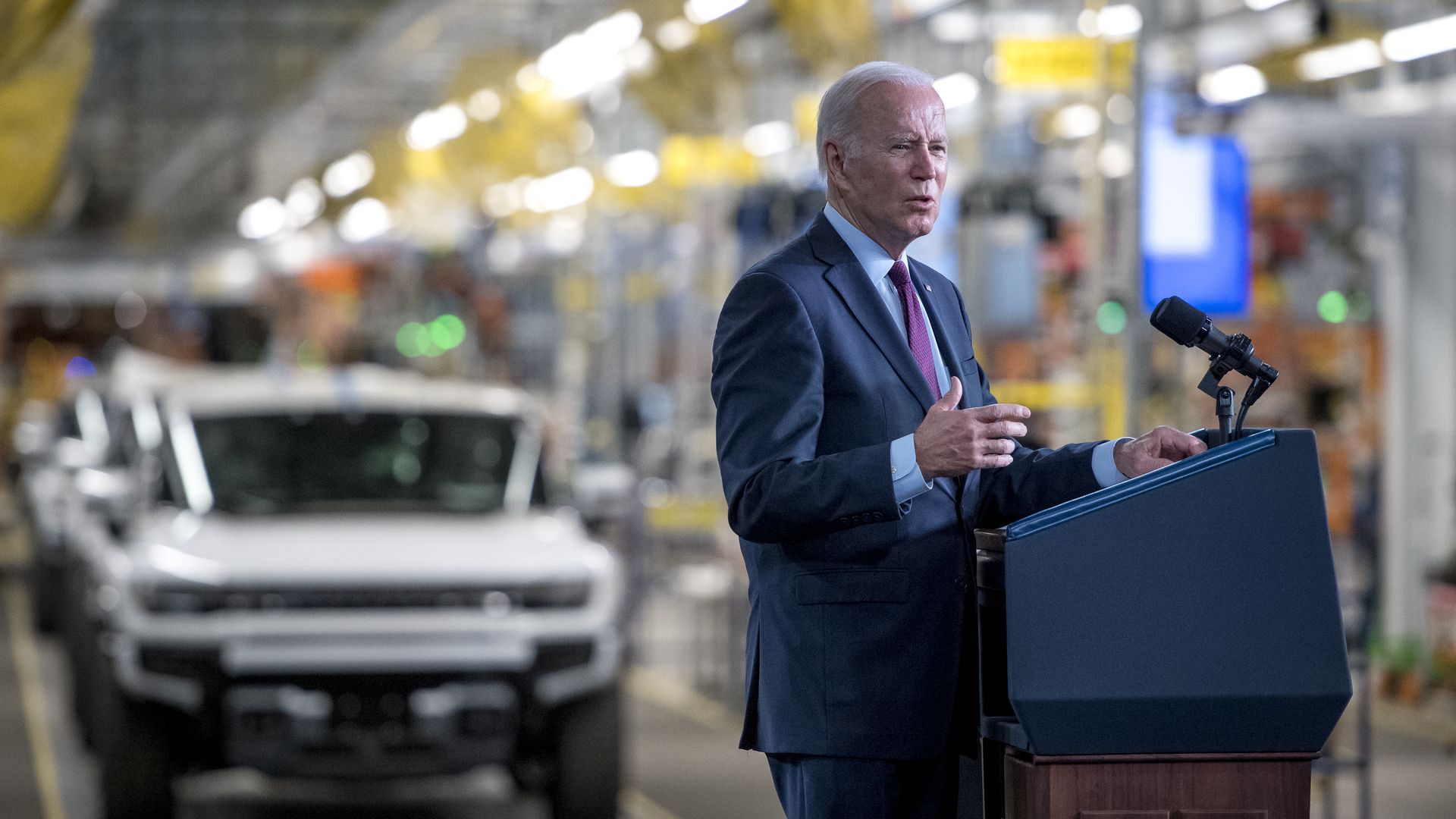Biden at the General Motors Factory ZERO electric vehicle assembly plantin Detroit. Photo: Nic Antaya/Getty Images
President Biden's Environmental Protection Agency announced far-reaching climate regulations this week in an attempt to dramatically alter how Americans drive over the next decade.
The big picture: The proposals are designed to ensure that two-thirds of new passenger cars sold in the U.S. are all-electric by 2032. Less than 6% of new vehicles sold last year were electrics.
Why it matters: Trying to impose top-down regulations to nudge Americans' behavior is rarely politically popular. Just look at the intense backlash over federal vaccine mandates that were ultimately struck down by the Supreme Court.
- At a time when Republicans have been playing defense over Trump and abortion, Biden just handed them a gift that could rally the GOP base and put red-state Democratic senators in energy-rich states (such as West Virginia Sen. Joe Manchin and Montana Sen. Jon Tester) on the defensive.
Zoom in: If Biden's plan goes through, consumers in nine years would find fewer gasoline options and be compelled to buy vehicles that currently are more expensive and have less driving range than traditional cars.
- There are also logistical challenges: Electric cars currently are dependent on Chinese manufacturers and tech companies for parts and batteries. The domestic supply isn't close to meeting the demand expected with the new regulations.
- There also aren't enough electric charging stations in the country yet to handle a surge in demand, especially outside urban areas.
Yes, but: Between the 2021 bipartisan infrastructure law and the 2022 Inflation Reduction Act, Biden has already set the wheels in motion to try to make EVs more accessible and affordable. This includes:
- Spending $5 billion for 500,000 highway chargers and $2.5 billion for community chargers.
- Setting price limits and income restrictions on EV tax credits to steer benefits toward mass-market buyers.
- Tax credits for used-EV buyers.
- Lucrative tax credits for companies that build EVs and batteries in the U.S., which could trickle down to consumers.
By the numbers: A new Gallup poll, released Wednesday, shows Americans' widespread reluctance to embrace electric vehicles.
- Only 4% said they currently own an EV, and just 12% more are seriously considering buying one. A sizable 41% of adults said they'd never buy one.
- Just 12% believe that driving electric vehicles does a "great deal" to reduce climate change, while 27% said it does a "fair amount."
- Electric vehicles are an especially tough sell for Republicans: 71% said they never plan to own one.
A separate Pew Research poll from last summer showed 55% of Americans opposed phasing out new gasoline-powered cars and trucks by 2035, while 43% supported it.
- Most of those inclined to consider an EV in the future were younger adults and urban dwellers — critical elements of the Democratic base that Biden needs to turn out for the 2024 election.
- Overall, the poll found that 49% of adults said the Biden administration’s policies on climate change are taking the country in the right direction, while 47% said they represent the wrong direction.
Between the lines: There are signs the White House hasn't gotten buy-in on the climate regulations from the typically supportive United Auto Workers labor union and automobile executives who have been ramping up supplies of electric models.
- The Biden administration initially intended to dispatch EPA Administrator Michael Regan to announce the new regulations in Detroit, where he'd be surrounded by American-made electric vehicles, according to the NYT.
- But many key stakeholders weren't supportive and declined to participate, the Times reported. The announcement then was moved to EPA headquarters in Washington.
Reality check: It's likely these regulations will be challenged in court as regulatory overreach, and ultimately they could be tossed out by the conservative-majority Supreme Court.
- Many of Biden's climate policies could also be reversed by Congress or a new president.
Notable quotable: Biden's climate plan already is facing dissent from one prominent Midwestern Democrat, Rep. Debbie Dingell (D-Mich.)
- Dingell told Politico: "Everybody cares about global warming, but I’m hearing from too many people in this country — I mean, strong Democrats — that they can’t afford an electric vehicle.”
The bottom line: The biggest vulnerability for Biden in 2024 is the prospect of a weak economy, with fears of a recession and inflation still at historically high levels.
- Spending political capital on a climate change initiative geared largely toward the affluent part of the electorate — not the Americans struggling to pay for a new car — threatens to exacerbate Biden's economic challenges.
- The Democratic coalition has, until recently, been very dependent on working-class Americans. Over the last three decades, the Democratic base has shifted to appeal to wealthier, college-educated urbanites, while Republicans have dominated the working-class vote.
- That's left Democrats frequently stuck in a bubble of the progressive base, which is more affluent than the average voter.
Source: Read Full Article
-
Sunak admits ‘regret’ at hiring Williamson as he fights to get a grip
-
Former Brexit negotiator Barnier in cheap shot as Eurozone slides into recession
-
Peers ‘exploitation’ of leave of absence from House of Lords to be probed
-
Las familias inmigrantes en Denver ahora pueden solicitar asistencia
-
Brexiteers holding urgent meeting to scrutinise new ‘details’ of deal


